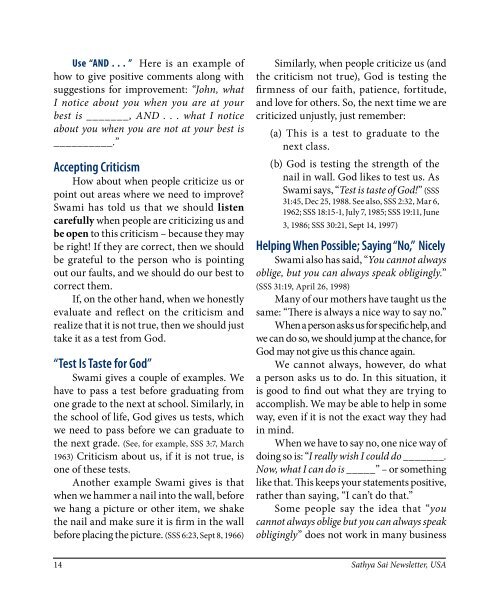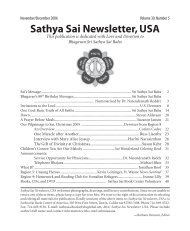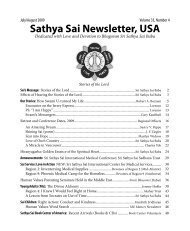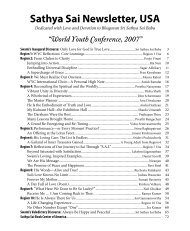Sathya Sai Newsletter
2013 - 3rd Quarter (2.4 mb) - USA Sai Organization
2013 - 3rd Quarter (2.4 mb) - USA Sai Organization
You also want an ePaper? Increase the reach of your titles
YUMPU automatically turns print PDFs into web optimized ePapers that Google loves.
Use “AND . . . ” Here is an example of<br />
how to give positive comments along with<br />
suggestions for improvement: “John, what<br />
I notice about you when you are at your<br />
best is _______, AND . . . what I notice<br />
about you when you are not at your best is<br />
__________.”<br />
Accepting Criticism<br />
How about when people criticize us or<br />
point out areas where we need to improve?<br />
Swami has told us that we should listen<br />
carefully when people are criticizing us and<br />
be open to this criticism – because they may<br />
be right! If they are correct, then we should<br />
be grateful to the person who is pointing<br />
out our faults, and we should do our best to<br />
correct them.<br />
If, on the other hand, when we honestly<br />
evaluate and reflect on the criticism and<br />
realize that it is not true, then we should just<br />
take it as a test from God.<br />
“Test Is Taste for God”<br />
Swami gives a couple of examples. We<br />
have to pass a test before graduating from<br />
one grade to the next at school. Similarly, in<br />
the school of life, God gives us tests, which<br />
we need to pass before we can graduate to<br />
the next grade. (See, for example, SSS 3:7, March<br />
1963) Criticism about us, if it is not true, is<br />
one of these tests.<br />
Another example Swami gives is that<br />
when we hammer a nail into the wall, before<br />
we hang a picture or other item, we shake<br />
the nail and make sure it is firm in the wall<br />
before placing the picture. (SSS 6:23, Sept 8, 1966)<br />
Similarly, when people criticize us (and<br />
the criticism not true), God is testing the<br />
firmness of our faith, patience, fortitude,<br />
and love for others. So, the next time we are<br />
criticized unjustly, just remember:<br />
(a) This is a test to graduate to the<br />
next class.<br />
(b) God is testing the strength of the<br />
nail in wall. God likes to test us. As<br />
Swami says, “Test is taste of God!” (SSS<br />
31:45, Dec 25, 1988. See also, SSS 2:32, Mar 6,<br />
1962; SSS 18:15-1, July 7, 1985; SSS 19:11, June<br />
3, 1986; SSS 30:21, Sept 14, 1997)<br />
Helping When Possible; Saying “No,” Nicely<br />
Swami also has said, “You cannot always<br />
oblige, but you can always speak obligingly.”<br />
(SSS 31:19, April 26, 1998)<br />
Many of our mothers have taught us the<br />
same: “There is always a nice way to say no.”<br />
When a person asks us for specific help, and<br />
we can do so, we should jump at the chance, for<br />
God may not give us this chance again.<br />
We cannot always, however, do what<br />
a person asks us to do. In this situation, it<br />
is good to find out what they are trying to<br />
accomplish. We may be able to help in some<br />
way, even if it is not the exact way they had<br />
in mind.<br />
When we have to say no, one nice way of<br />
doing so is: “I really wish I could do _______.<br />
Now, what I can do is _____” – or something<br />
like that. This keeps your statements positive,<br />
rather than saying, “I can’t do that.”<br />
Some people say the idea that “you<br />
cannot always oblige but you can always speak<br />
obligingly” does not work in many business<br />
14 <strong>Sathya</strong> <strong>Sai</strong> <strong>Newsletter</strong>, USA













